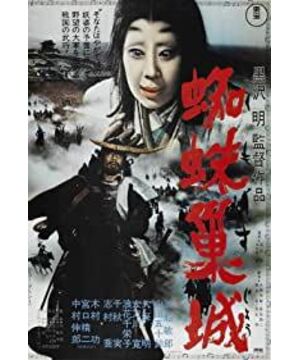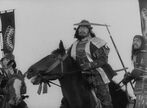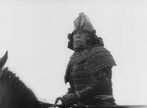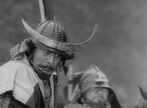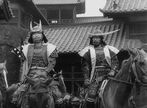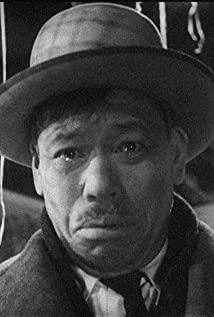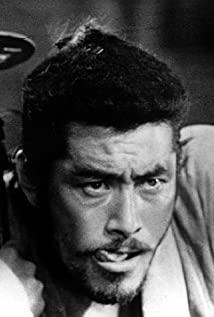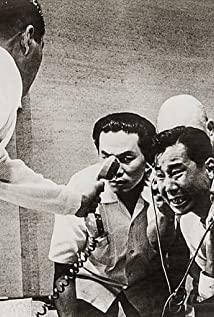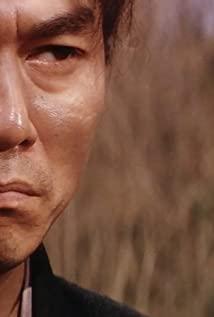look at the ancient city ruins full of desires,
wandering ghosts still linger
, people 's desires are like a tragic battlefield,
no matter ancient or modern
, they will never go away.
Akira Kurosawa's "Spider's Nest" is basically faithful to Shakespeare's original "Macbeth", only a few plots have been slightly changed . The success of the film is partly due to this "faithfulness". Because as the song says: "Man's desires, . . . never change, whether ancient or modern." What expresses human nature (good and evil) knows no borders.
So the rest of the work is to fill the "ghost" of Macbeth with the blood and flesh of the East, and then place it in the historical background of Japan's Warring States Period - Washatsu Takeshi was born.
A soldier who does not want to be a general is not a good soldier, and a samurai who does not want to be a city lord is also not a good samurai. Washatsu is of course a good samurai, he is a capable general of the Spider Nest Castle, and he is invincible on the battlefield. He is brave, agile, and fearless. He drove his horse forward, and his friend Miki (also a general under the city lord) strayed into the Spider-Hand Forest. From then on, he was no longer invincible, but retreated in the labyrinth of fate surrounded by desire, and finally completed his self-destruction.
Akira Kurosawa added some details that "Macbeth" did not have. For example, in the dialogue between Washatsu and his wife Asakusa, it is implied that the seat of the current city lord Tsuzuki was also obtained by killing the king. As Mao's "bewitching", those who are a little familiar with Chinese history know that it is not all alarmist: the death of the cunning rabbit, the cooking of the running dog, the death of the birds, the possession of the good bow, the destruction of the enemy's country, and the death of the plotter. The desire for power bewitches everyone, it can push it to the top, or it can lead people to fall into the abyss of doom in an instant. This is a story with a predictable ending from the very beginning, but Akira Kurosawa gives this oriental Macbeth a lot of room to play, rather than simply blaming "evil" for his actions. Washatsu, who returned from the Spider-Hand Forest and became the lord of Beicheng, fell into the prophecy of the monster. He was hesitant and uneasy, showing the inherent cowardice of ordinary people and the fear of the unknown fate. After killing his benefactor overnight, driven by excessive ambition, he returned to his room with a blood-stained weapon, completely shocked by the crime caused by his lust for power. In the film, his rough and angular face is extremely twisted under the tear of ambition, which is impressive. Washatsu, who succeeded in killing the king, became the city lord of the Spider Nest City as he wished, but after a short period of satisfaction, there was even greater fear. He wants to stop the third prophecy of the monster - Miki's son will eventually replace him without heirs as the castle lord. When the assassin sent by Asakusa presented him with Miki's head, he rejected the assassin and couldn't bear to watch. At the banquet, the extremely nervous Washatsu had hallucinations and saw Miki's ghost. And his wife, Asakusa, was also confused due to excessive mental stress. She kept washing her hands every day, not knowing that the sinful blood was not on her hands, but on her heart.
In this way, Akira Kurosawa revealed the dark corner of human nature, just like a lot of black backgrounds in the film, attracting people to go deep into the place without light. The son of Miki surrendered to the enemy, and the dry army attacked Spider Nest City again. Washatsu went deep into the Spider-Hand Forest for the second time and asked the monster about the result of the battle. Does not fail unless the forest moves. The irrational Washatsu arrogantly made an oath to make the Spider-Hand Forest turn into mountains of bones and rivers of blood, and drove off. He didn't see the wicked smile on the corner of the monster's mouth, and he forgot the song that the monster sang to him and Miki when he first appeared:
How ugly the world is, since it is
born in the world
as cheap as an ant,
why do you have to ask for trouble if you steal your life, how stupid
life is like a flower , come and go in a hurry and
must eventually turn into a carrion skeleton
People don't
hesitate
to jump into the deep pool of five turbidities for the sake of power When his wife was dead and the situation was over, he also left a classic line: tomorrow, another tomorrow, another tomorrow, moving this kind of trivial footsteps every day until the last syllable of the recorded time; all our yesterdays are for fools They illuminated the buried road. Put it out, put it out, short candle! Life is just a shadow. The poor actor swayed on the stage, and after a while, he disappeared. It's an absurd story, told by an idiot, full of noise and frenzy, with no meaning at all. Kurosawa obviously grasped the impermanence and fate-like sadness of life, but added a lot of local Japanese cultural factors. Buddhism spread to Japan from the east, combined with Japanese native Shintoism to produce a unique aesthetic consciousness. The heart of the characters in the story is not a spiritual world in which beauty and ugliness, good and evil are diametrically opposed. On the contrary, in the complex evolution of the characters' feelings and human nature, ugliness can be transformed into beauty, and evil can be transformed into good. As a result, the deep unity of spirit and flesh of human nature can be excavated, revealing the nature and truth of human nature. Therefore, Akira Kurosawa finally let Washatsu die with arrows pierced through the heart. Such a character proceeds from hatred to compassion for the general weakness of human nature. And "as cheap as ants, yet stealing life", "carrion blossoms and releases fragrance", which contain the emptiness of Buddhist enlightenment and the feeling of sadness because of seeing the impermanence of the world, which is secretly in line with the traditional Japanese aesthetic consciousness of "matter sorrow" , so that the connotation of the film also infiltrates the oriental sentiment of "emptiness" and "nothingness".
Akira Kurosawa's success is not so much a success of compatibility with Eastern and Western cultures, but a success of choosing themes and entry points, rather a success of "seeking common ground while reserving differences" between Eastern and Western cultures. The Japanese's unique awareness of intuition and sense of "sorrow" and the resulting "beautiful", combined with the tolerance and compassion of Buddhism, avoid the arbitrariness and decisiveness of Confucian moral ethics in judging the good and evil of human nature. . There is no clear boundary between good and evil, everything is only between people's thoughts. The Spider's Nest City - this strange name, with the strangeness and terror from the foreign land - is actually a labyrinth of human desires. One day, when we truly look at human nature with compassion, when we lift off the "good" or "evil" cloak that wraps human nature and look directly at the exposed soul, I am afraid that what we will find is nothing more than a A fragile and easily lost heart.
The sadness of human nature is nothing more than this spider's nest city that can never be walked out.
View more about Throne of Blood reviews


